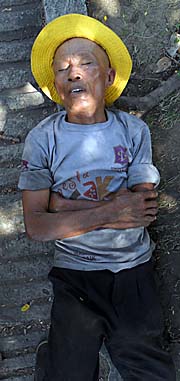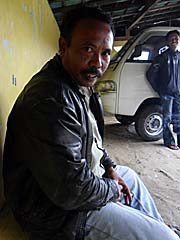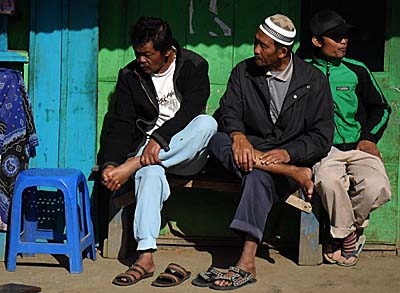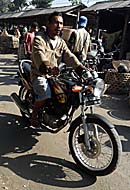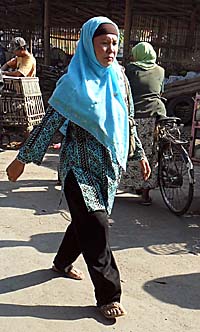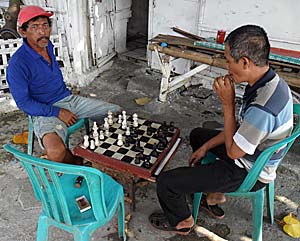
"If a well-to-do, stand-up ethical person
would be thrown into a poor city with nothing,
deprived of all his resources,
there is a high probability
that this person would start to lie,
to cheat and to steal, just in order to survive."
Zeitgeist Orientation Guide
As mentioned at other parts of this website, people are different and it's difficult to describe a population as a whole. There are reasonable and intelligent people on Java, no doubt. There are moderate and kind people, who have good manners. It's only, that they are extremely rare on Java. A thoroughly rotten mentality of dishonesty and fraud is predominant here.
Just while I write this sitting in a restaurant there is a man behind me noisily burping and chumping. Not for a moment - for long. Such and many other much more weird observations suffers the traveller every day manyfold.
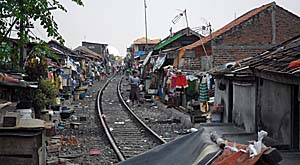
A slum in Surabaya. Image: Asienreisender, 2012
Generally, that's here as it is mostly everywhere, people in the countryside are much more friendly and relaxter than people in the urban centers. On Java there is not much countryside left. It's said, Java would be the most overpopulated island in the world. The cities are big, and towns and villages stretch everywhere over the countryside, interrupted by rice paddies and impassable mountains. Almost all what is not urbanized is cultivated until high up into the mountains. That comes together with a high traffic level even on remoter areas.
The vast majority of people here is very low in behaviour. 'Mister' here, 'mister' there, 'mister' everywhere. But in a ridiculous way, nothing serious in it, not seldom at the brink of impudence or a step further. People stare permanently to a western traveller. Drivers try all the time to make business and at the beaches of e.g. Pangandaran or Cilacap many guys permanently want to sell a boat trip. "MISTER! -- MISTER! -- BOAT!", from the distance of 30, 40, 50 meters. Not a perfect starter for a sales talk.
The touts at the bus stations are even following a tourist to the toilet, where one hears them in the background shouting: "Mister, mister!".
When you are in an elevator and after the door opens you want to leave it, the people waiting outside don't give you any time or space to do so. They immediately enter the device.
When eating, people leave more or less food remains on the table. When the waiter later wipes the table clean he might do it so hefty that people sitting on neighbouring tables might get their share on their trousers. If the waiter realizes that, what he normally wouldn't, then he is laughing about it. Javanese humour.
The kind of approach to a foreigner is generally distanceless. I am asked about 50 times a day by bypassers without any introduction where I were from. Sometimes they are anywhere behind me and I don't even see them. They anyway don't care for eye-contact, when asking their dull questions.
Almost every man who sees me is asking me the always repeating same question: 'Where are you from?' In the background are normally others who laugh then (about what, actually?).
That's not to mix up with another question, the 'Where are you going?' (Mau ke mana?). That's annoying many foreigners, but it's just an Indonesian equivalent of 'How are you'; nobody would tell the asker then how he really feels and what happend today and so on; that's the same with the 'Where are you going?'. One can just reply 'Having a stroll' (Jalan jalan) or whatever. Though, not seldom it's meant as a starter for a sales talk. And, in many cases, it's another clumsy approach and does not at all fit to the situation.
The Javanese have also the tendency to behave in an authoritarian, commanding way. Where to sit in a restaurant, to queue properly in a line or to do whatever they think is a 'must' to do. The only thing they might learn in school is marching and singing patriotic songs, lifting flags and celebrating it end to end. Everything what has to do with the military is adored.

Big noise, big fun, day and night: here: Karaoke. Image: Asienreisender, 2012
Asian's are notorious noise-makers. They say, they like music, but in fact they like it noisily only. It does not make a difference for the most people here if they run their crappy, noisy music at the highest possible volume with the maximum of basses or a standig car or motorbike. They can not stand silence.
Even if they clean their motorbikes or are waiting for anything for long they let them run. It's all they have - they live mentally empty lives, that's their only content.
A few guys around might have a loud talk together for some 30, 40 minutes. If they are eventually gone on their noisy motorbikes, a loudspeaker announcement from the next mosque might start. This guy might talk very noisy for another 40 minutes in an aggressive, impertinent style. Followed then by heavy noises coming from any machinery out of the neighbourhood or a nearby building site. That's all socially accepted all-day-life. Nobody disagrees with the heavy noise pollution or would offend the noise-makers.
A great deal of people here lie and try to cheat all the time, in any restaurant, at any booth were one wants to buy a simple water or on the busses. If they see a Westerner and are asked for a price, one can see the mosquito brain runnig hot while thinking over how much they could demand in maximum. When paying anything at many occasions they try to peculate the change.
When I am paying anything, all the people around me get really long necks and try to get a deep glance into my wallet. Meanwhile I use to hold it in a way that they can not.
Even in such internet guides as www.wikitravel.org are the prices given too high. The articles authors were deceived as well. There are certain prices, the difficulty is to find them out, because they are not displayed in public.
Fraud also happens in supermarkets, where the prices at the goods are not according to the prices given at the cash desk. And, in my observation, it's always to the disadvantage of the customer. Sometimes are prices given which don't exist. A price of 7,310 Rupuees can not be payed, because there is no smaller unit than 100 Rupees. The customer pays then 7,400 Rupees. Or more, one can not be sure about it - nothing is reliable.
The mass of the Javanese people has been exploited since a long time. In the 350 years of Dutch rule much of the countries wealth was taken away, and since the independence it didn't change much. Now it's the world market on wich the Javanese elities are playing together with the international companies, the 'global players'. They grow rich and superrich. For the mass of the people remains nothing. Seen it so, the cheating and lying of the Javanese is just the trial to take a very little back of all the wealth what is stolen from them. The difference is, that cheating and lying in a direct, interpersonal relationship appears obviously as a nasty trait, while business based on law is generally accepted (though, after all, much more desastrous).
Wikitravel.org also gives advice (in the Borobudur section) to be friendly to the local people, although they were so pushy. A smile and a simple 'no' would do it. Unfortunately it's not so. They don't let go. You can tell them three times, five times, thirteen times you wouldn't buy anything, they don't stop annoying. After you got finally rid of one of them, the seller next door, who watched it all, starts it all again from the scratch. And then the next one. That can be very nerving.
Javanese's business behaviour is really peculiar. They don't seem to realize that they have no chance of making a business when it's denied by the expected customer. They don't realize or accept limits. They stubbornly and stereotype try it again and again, against all odds. They seem not to learn. There is something retarded about that psychology.
All the masses of drivers are everywhere and permanently trying to make you their customer. A usual approach is: "Okay! 50,000!" They simulate in the opening an agreement, although there is not even an eye-contact established. Sometimes it comes from behind. They have not the slightest sense for a proper approach.
Sometimes, when I completely ignore the salesguys, after addressing me four, five times they start to whistle and, when that doesn't help either, they drum with a stick on something.
The puffery is for me sometimes so repulsive, that I even don't enter a restaurant although I was actually willing to have food there.
It's also impossible to have a calm look for anything in a shop. Immediately there is a tout on one and start's to push one to buy.
I tried over years a lot of different behaviours to deal with that. My best experiences in such extreme cases are to completely ignore them. I act, as they weren't there. That saves me a great deal of energy and doesn't cause a single problem.
If one is friendly to these salesmen or drivers he rather encourages them in being more surreptitious.
By the way, my experience is, that people who behave so bad cheat each other also all the time if they anyhow can. It's nothing particular against foreigners. They are so. It's their 'culture', if you want so. Or what's left of it. Degenerated masses of poor people. Depressing to see that. Populations sink very low in long-term poverty and hopelessness. I have seen it even worse in India.
The significant problem group here are male between six and seventy years old. Women are very much under control of men, particularly when they are Muslims. Must be quite a privilege to be guided by such gentlemen through the whole life. An overwhelming number of women, defenitely the majority, is wearing a kerchief (hidchab) nowadays. That's a change from the mid-1990s, when this number was much smaller, a minority. It's particularly a pity for the children to grow up in such a degenerated society.
There are five religions accepted by the Indonesian state. It's Islam, Hinduism, Catholicism, Protestantism and Buddhism. Being not a member of one of these churches is considered as a criminal act under the Indonesian constitution [!]. Atheists for example are considered as criminals and there are examples for that atheists are persecuted by the state. Born Muslims, who want to leave their religion, face serious consequences. There is a recent example of a young man who was sued for confessing on facebook being an atheist. During the trial there was an angry mob outside the court demanding his dead.
By the way, there are some interreligious marriages. It's not often the case, but it's possible for Muslims and Christians to marry without that one part has to convert his religion.
Everywhere around is litter. Many people literally throw their rubbish out of their houses windows. That's particularly so in the countryside and the slums of the cities. Directly around the houses piles all kind of rubbish up - plastic and organic stuff. Part of it attracts mosquitoes, flies and other animals. Frequently I see people of all ages and social status dropping litter wherever they are without the slightest concern.
Watching Javanese (Indonesians in general) treating animals is disgusting. They have no sense for other beings at all. They transport cages full of birds and turn them upside down to squeeze the cage into a bus, they chop living fish with knifes, they torture and kill without conscience. They rather respect dead things like cars, their bloody motorbikes, TV's, mobile phones, music devices than living beings. Many times I see birds hanging in cages in front of houses in the bar sun all over the day. If I ask them why they are doing that, they tell me they would love birds.
On the way down from the Mount Merbabu peak I saw a young monkey, a macaque child chained at a garden fence. The holders made him a ring through his testicle to fix the chain in there.
Generally there is a very high rate of retarded people on Java. Social deprivation is a huge and, as it seems, a growing problem. In Purwokerto I saw an about 25 years old man walking on the road. Completely naked. Many people talk to me, many of them approach in a really weird way. If I try to communicate with them, it comes out that they are not able to. Younger people giggle and laugh at many occations when they see me. They must be under great social pressure or completely unable to come along with such a for them unusual situation to use such a ludicrous bad habit as a valve.
In a bus in Solo I saw a man (about 40 years old) picking in his nose and smudging it on the seat in front of him.
In Probolinggo I saw an older man on the roadside, throwing a pair of trousers and a shirt on the street and watching the cars and trucks driving over it. Then he threw an old can and some stones on the road. When I passed by he first begged me for some money, then he waved me through like a policeman.
When I am in a shop and I have a look for bottled water, then there are the people staring at me and there is for sure somebody telling me that it is water. When I am on the street and I watch a cat, somebody, who is all the time staring at me, tells me that this is a cat. When I take a cup of tea somebody who is staring at me is telling me that this is tea. When I have a look at a picture on the wall, it's the same thing - no word about what is on the picture. When I have a look for anything, anybody who is staring at me tells me, what it is. It seems sometimes, they consider me as a stupid animal - might that be a reflection of what they are?!
Also many people have the bad habit to ape me. When I am for instance ordering something in a restaurant, there is a big chance that anybody will ape my ordering. Other guys are laughing then about that. That occurs in many all-day-situations.
Sometimes, when I order something in a restaurant and another guest, who is just sitting around, didn't understand my order, he askes the waiter what I ordered. Then the two might talk that over. Sometimes the waiter might forget me about that. It's real comedy here.
Asking a Javanese for anythink makes him normally hesitating, then requesting at anybody else around. He needs to be reassured. Only then he gives an answere - if he gives any.
In the shops are many young people employed as salespersons. They have not the faintest clue what they are selling and are unable to give the simplest information about it. When a foreigner appears, they completely don't know how to behave. They start giggling and laughing and uttering comments about the foreigner among each other without addressing the foreigner. They laugh and laugh and laugh, doesn't matter, how one behaves. That might be amusing at the first times, but in long-term it's certainly not. They haven't learned anything and they lack any manners, not only in such (for them strange) situations.
If I need anything (information or a merchandise from the shop) I normally won't get it in such a situation. The youngsters are just not able to react reasonable anymore. Out of order.
Another experience is, let's say at a hotel reception, when asking for a bus connection and the stuff doesn't know the answer, they just completely ignore the traveller. They do anything else and one is suddenly just air for them. You can ask them again then, but there won't be any response anymore. They don't know, how to behave anyhow properly. They never learned that. To avoid a face lost, they are ignorant.
Also remarkable is the observation, that many younger men here have a really shrill kind of laughing. It comes in a high voice and sounds really mad. A bit like a noise uttered in despair. These comes from youngsters who listen to somebody else with a higher social status and might express agreement. I have heared people uttering these shrill laughters for two, three hours when being in conversation.
There is no joke too stupid in Indonesia not to be made and laughed about in the shrillest tones.
Together with the high rate of mentally retarded on Java comes also a high rate of physically handicaped people. I see several daily.
Women are fairly banned from public life in very contrast to the most of Indochina. They are much more out of business, decision making and anything what comes together with public appearance. Many wear kerchiefs and are kept in the households, in the background. Men do most of the jobs here. That might be another reason, why the general standards here are so low. The verymost men here seem to be good for nothing.
Women depend very much on men here. All the basic decisions of their lives are made by men, either their fathers or later their husbands. Also whom to marry is for the most not a free decision. They have, apart from unemployment and a lack of qualifications, no freedom of choosing a job.
Women are of course not 'better' than men. They are in the background, men are in the foreground; that makes male misbehaviour much more displayed than female's. Women spit their poison in gossip and intrigues. They have a more subtle influence. Sometimes they appear as dirty as the men do, when cheating and lying and misbehaving as well. Also they have the tendency to unload their frustrations on their children, what can be a heavy burden for them.
Funny thing here in Indonesia: the Indonesians pronounce the 'r' sometimes rolling it in their throat. When speaking Indonesian and not 'rolling' the 'r' enough, it's sometimes not well understandable to them. This 'rolling' is funny because in the whole of Indochina it's completely unknown. There the people have rather problems pronouncing even the English soft 'r' but, instead, pronouncing it as 'l'.
Another remarkable observation here in Indonesia is the Indonesian's passion for chess. Many people are seen playing chess here in restaurants or on the street. They also play an interesting style what is, of course, very different from the classic way one learns e.g. in a western chess club. It's really thrilling to play a game with a local here and there.
Indonesians have the strong tendency to tell one what they think one want's to hear. If you ask them for the way, they give a pleasant answere, even if they have not the faintest clue. If not that, they tell one what they want is true. That has mostly to do with monetary ambitions.
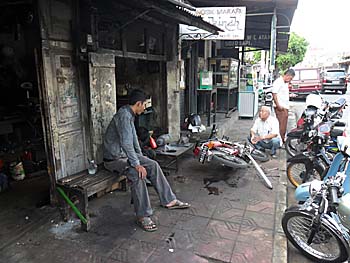
A motorbike workshop in Yogyakarta. All the workshops are extending to the sidewalks. Image: Asienreisender, 2012
Despite long-term travelling in Indonesia (a year in total) and having contact to Indonesians also in Europe I have to say, that I never got a good idea or an fascinating thought from an Indonesian. It's all banalities, superstition and consumerism. In the middle-class it's additionally about making a career and again about money-making.
When Asian people in general rise from a poor or simple background up to middle-class, they skip any cultural development or education. They immediately become decadent consumer idiots, without any deeper understanding of their history, environment or society. Just escaped starvation, they are first longing for a big car, followed by TV's and all the other consumer accessoires of a western middle-class lifestyle. They show no depth and no interest in a deeper understanding of life.
In the 20th century there were strong secularly movements like liberalism and socialism; religion lost influence over people in Indonesia.
After the coup de etat of General Suharto against the Sukarno government 1965 many leftists were persecuted or killed (500,000 killed, many imprisoned in camps for years). The coup was supported by western powers, particularly the USA. The Suharto dictatorship tried hard to exterminate all leftist ideas and to consolidate total power for himself and his cronies.
Since the 1980s the neoliberal revolution made it step by step around the globe. The extremest kind of Capitalism. Living conditions of the masses decrease since then. That is very clear here in Indonesia. Also the system change from the Suharto dictatorship to a parlamentarian Democracy had no or only few positive results for the masses of the people. Corruption, environmental distraction, poverty and social injustice seem even worse than before.
As a reaction to this religion is on the rise in Indonesia. Religion gives the people somewhat to believe, an imaginary explanation of life, an identity, a seeming meaning, and comforts them in their misery.

A rural scene from Java. Over most of the time of their history Javanese people were farmers. Thrown into modernity of the 21st century they didn't learn to adapt to our times. Image: Asienreisender, 2012
The message is: If you suffer a great deal in this life, be ensured, next life will be much better. This life is just a transformation to the next life; important is only to beliefe in the religion and follow their rules. That keeps people calm and willing to stand all the annoyances and injustices they have to tolerate a life long. It keeps them dull and abusable for the interests of the people behind the scene. And it keeps the rich safe from unrest and uprises. Most of the times, at least.
Organised religion is always allied with the state. They work together to keep the people silly and poor.
Both, the neoliberal revolution and the reemerging religion come unavoidably together with a sharp decline of intelligence.
Since the capabilities of planning and organizing and the technical and artisan skills of contemporary Javanese are so low, I doubt that they could perform such kind of a 'world wonder' as the Borobodur monument or as the great temple complex of Prambanan nowadays. Contemporary Javanese society is far behind it's cultural level of the medieval age around 1,200 years ago.
I don't see that Indonesians have any vision or concept for their future. No idea about improving the country and the living conditions of the people. It's all just about money, business for the moment, no long-term, not even mid-term thinking.
Since I don't believe in Indonesias economy for it is absolutely not sustainable, I could imagine that the country will face bad times soon. The Javanese society is a society with an iridescent past, a poor present and without a future.
Many children who see me say only one single word to me: "Money!". The sweetest word ever. They are taught begging by their parents or by peers; the peers then are taught by their parents.
If you are a smoker in Indonesia, you are very happy - you don't need to smoke your own cigarettes anymore. The men here smoke so much, that there is an abundance of smoke everywhere. You always get your share.

The most important piece of furniture is the ashtray. Image: Asienreisender, 2012
When sitting in a restaurant it normally does not take long until a Javanese man with the unavoidable cigarette is taking seat near you and tries to start a silly small-talk. The best method to get rid of him is to ignore him completely. They find that very irritating and disappear after a while. Explaining them anything about the disadvantages of smoking is futile.
It seems that almost every male is a smoker here. Indonesia is the last country in Southeast Asia, in which smoking is so common. There is a certain kind of carnation cigaretts who smell peculiar and strong. The tobacco is dense plugged so that the cigarette lasts much longer than the western ones. Smoking is almost nowhere prohibited, so they smoke in the busses, in the hotels, on the motorbikes, in the elevators, in the toilets, in short: non-stop smoking everywhere around. If smoking is anywhere exceptionally forbidden, they don't care. The most talented guys here do smoke and eat at the same time.
Nowadays it's not allowed to smoke in the trains. But, it wouldn't be Indonesia if the guys accepted it. They just keep smoking.
Women don't smoke. At least far not as many and not in public. It's socially not accepted.
Visiting Indonesia a Tourist has to consider the heavy smoking all around as an additional health risk while travelling here.
That's a short chapter. I don't see any education here on Java. I see entertainment all around the clock, but no education. The schools and the teachers fail totally. I wonder, what the people here learn in their religious schools and in the mosques...
Having a glance for most of the toilets on Java makes that you don't need it anymore. At any public toilets are one, two, three guys hanging out and cashing the customer.
A glance into the most kitchens is not much better. An old traveller rule is that the hygiene of toilets and kitchens in a place are corresponding with each other. Some Javanese themselves have provisos against much of the food here. It's a good idea not to eat meat. Particularly when the meat is hanging the whole day open on a hook in the heat with all the flies, street dirt and dust on it.
One can not expect clean glasses, cups, dishes, cutlery.
Handwashing is not common in Indonesia. Many of the public toilets, although they always cost money, are not equipped with a possibility to wash hands. Generally very few places are equipped with soap.
I have seen official posters in schools with kind of manuals of how to wash hands properly. And recommendations to brush teeths and how to do that. That's not a common standard.
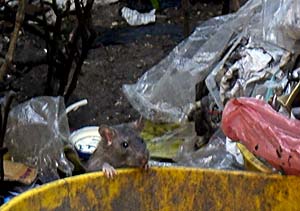
These sweet little fellows appear often in great numbers near restaurants where food remains are thrown. Nobody cares... Image: Asienreisender, 2012
The habbit to throw any rubbish just around, also around the houses in the villages and cities, attracts not only insects and rats, but also does not maintain a healthy environment.
In supermarkets there is sometimes a very bad smell. That comes, of course, when there is no care taken with food cleanliness. If in a supermarket durian are sold, it makes also a very bad smell. Well, Indonesians generally love it. In this case it does not necessarily mean a lack of hygiene. It's a matter of taste.
The traditional Indonesian bathroom has no shower. Instead there is a 'mandi', what is a tiled pool filled with water. With a dipper one takes water out and pours it over the body.
In the cities are a lot of rats, living a shadow life as culture followers, feeding from human litter. Sometimes one can see many of them around dustbins. In Surabaya a rat was passing under my chair while I was eating in an outdoor restaurant. Seemed very used to humans.
Indonesia is one of the most corrupted countries in the world and, according to transparency international, the most corrupted country in Southeast Asia. Corruption is everywhere, and it's all about money. Even the pupils learn in school that it is necessary to bribe their teachers to get good marks. School for life.
Everybody who has any power about anything uses it to make extra money out of it. That's particularly so with officials. As higher their rank, as more trouble they can cause and as more bribes they can demand not to. That does not only mean that companies and small business people have to pay money to bribe authorities, but at the end it comes down to the consumer prices. Bribes are at the end business costs. So, the consumer pays the bribes as well, if he realizes it or not. And the bribes are so expensive that it drives the prices considerably up, so that even Indonesian companies suffer from it, because despite to the slavelike wages for labour in Indonesia the Indonesian export goods become too expensive to cope on the world market with products from other cheap producing countries.
There is much talking here about corruption; it appears in TV, the papers, on posters in the public. The president started a campaign against corruption, promising the public a lot. The results are about zero. It's just idle talking to give the people the imagination something would be done. Corruption is undefeatable.
Eric Ambler gives a lively example of government corruption in his novel 'The Night-Comers'. You find an excerpt of the passage here.
And even the money bills, where money is concidered the best invention ever, are just dirty snippets of low quality. Passing everybodys unwashed hand they function as desease transmitters.
Before deciding travelling Indonesia one should really consider what to do here. When coming for a certain purpose it can be worth the journey. But, since the people here are so low, one has to be aware of all the annoyances coming with that. If one want's to spent time in a tropical country with culture, a phantastic nature and nice people with good manners and respect for others, it's defenitely more recommendable to go to Thailand.



